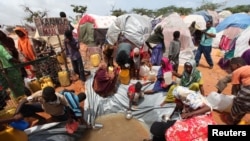UNITED NATIONS —
The U.N. humanitarian chief warned Wednesday that Somalia is at risk of a severe food crisis and that 50,000 children under the age of five could die from severe malnutrition if funding is not received quickly.
Valerie Amos told U.N. Security Council members that peace and stability gains made over the past two years could be in jeopardy if Somalia has to cope with a food crisis similar to the famine of 2011.
“Approximately 857,000 people in Somalia require urgent and life-saving assistance," said Amos. "An additional 2 million people are on the margin of food insecurity and require continued livelihood support.”
She noted that more than 1 million Somalis are displaced within their country and another million have sought refuge in neighboring countries.
Amos said political and security gains have not led to an improvement in the humanitarian situation. Late rains and unpredictable weather also are complicating matters, and could bring a below average harvest in July and August.
“The situation is further compounded by the ongoing military offensive, and the new al-Shabab tactic of blocking major supply routes and encirclement of newly recovered areas.”
She said the extremist group’s tactic of surrounding those recovered areas has prevented commercial activity and the ability to get humanitarian aid to those regions.
Amos said funding to humanitarian programs is down sharply, forcing the humanitarian community to cut back on all but the most basic of interventions. She said UNICEF has warned that 50,000 children under the age of 5 could die from severe malnutrition if funding is not received.
Of the $933 million the U.N. has asked of donors for this year, less than 20 percent has been funded. Amos said the U.N. needs an immediate injection of $60 million for the next three months to address urgent food, nutrition and health care needs.
Valerie Amos told U.N. Security Council members that peace and stability gains made over the past two years could be in jeopardy if Somalia has to cope with a food crisis similar to the famine of 2011.
“Approximately 857,000 people in Somalia require urgent and life-saving assistance," said Amos. "An additional 2 million people are on the margin of food insecurity and require continued livelihood support.”
She noted that more than 1 million Somalis are displaced within their country and another million have sought refuge in neighboring countries.
Amos said political and security gains have not led to an improvement in the humanitarian situation. Late rains and unpredictable weather also are complicating matters, and could bring a below average harvest in July and August.
“The situation is further compounded by the ongoing military offensive, and the new al-Shabab tactic of blocking major supply routes and encirclement of newly recovered areas.”
She said the extremist group’s tactic of surrounding those recovered areas has prevented commercial activity and the ability to get humanitarian aid to those regions.
Amos said funding to humanitarian programs is down sharply, forcing the humanitarian community to cut back on all but the most basic of interventions. She said UNICEF has warned that 50,000 children under the age of 5 could die from severe malnutrition if funding is not received.
Of the $933 million the U.N. has asked of donors for this year, less than 20 percent has been funded. Amos said the U.N. needs an immediate injection of $60 million for the next three months to address urgent food, nutrition and health care needs.









